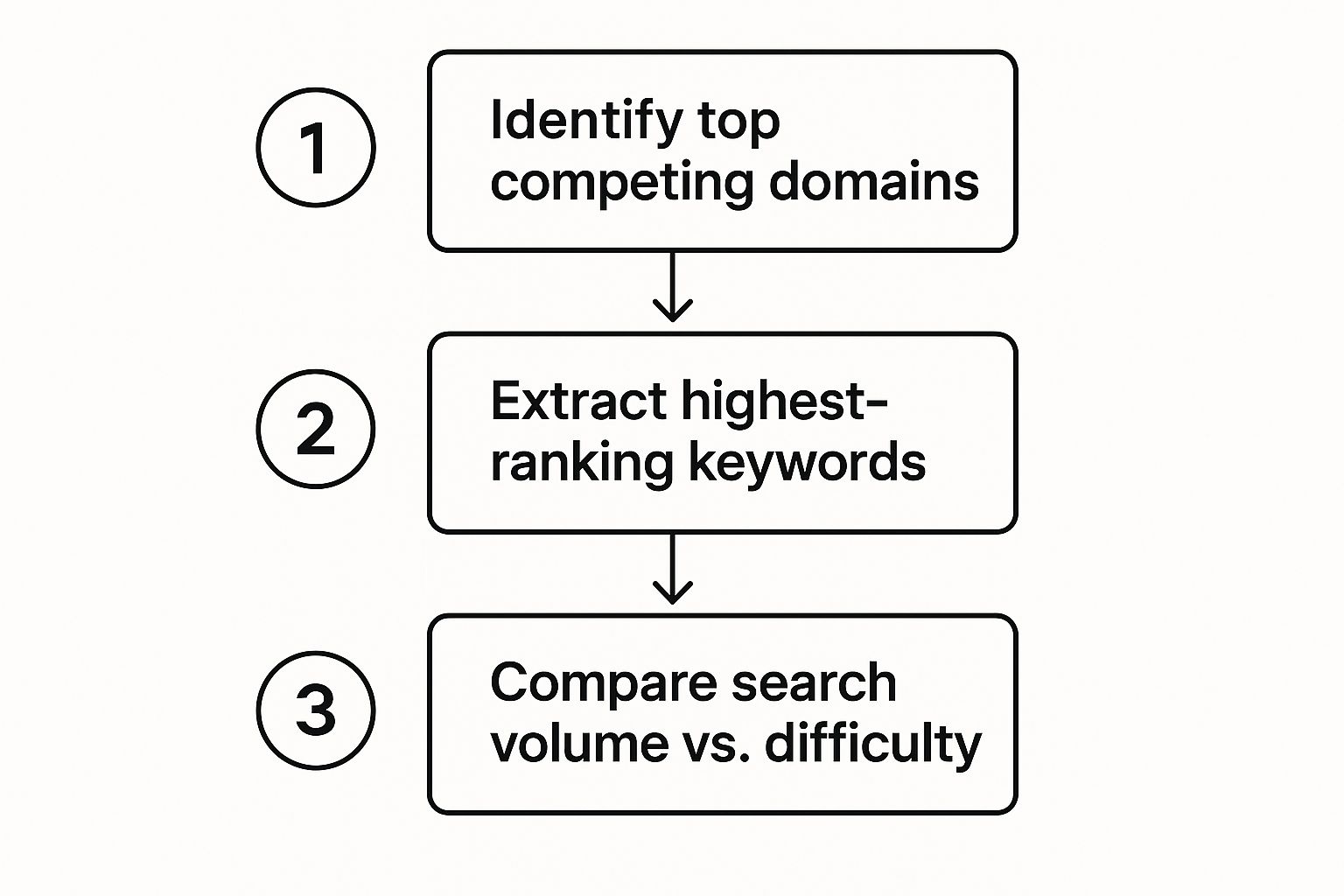How to Find the Best Keywords for SEO Success
How to Find the Best Keywords for SEO Success
Let’s get one thing straight: finding the best keywords isn't about chasing massive search volumes anymore. It’s about getting inside your customer's head, understanding their intent, and zeroing in on those super-specific, low-competition phrases we call long-tail keywords. This is how you attract people who are actually ready to act, not just casual browsers.
What Modern Keyword Research Really Looks Like
The old playbook of stuffing your site with high-volume keywords is dead. Seriously. Today, smart keyword research is less about filling up a spreadsheet and more about playing detective. You have to figure out what someone really means when they type a query into Google.
If you're new to this way of thinking, brushing up on the fundamentals of blog search engine optimization is a great place to start. It'll give you the "why" behind this crucial shift in strategy.
Moving Beyond Vanity Metrics
It's so easy to get mesmerized by huge search numbers. A keyword with 100,000 monthly searches feels like a jackpot, right? But in reality, it's often way too broad to capture the right kind of attention.
Think about it. Someone searching for "shoes" is just window shopping online. But someone searching for "waterproof trail running shoes for wide feet"? That person has a problem, knows the solution they need, and probably has their credit card nearby. That's where you want to be.
The real magic happens in the long tail—those millions of hyper-specific searches. Individually, they might seem small, but together they create a powerful stream of traffic that actually converts.
And the data backs this up completely. A minuscule 0.0008% of all keywords get more than 100,000 searches a month. Meanwhile, a staggering 94.74% of keywords get 10 or fewer searches each month. This just goes to show how vital these niche queries are for building a solid SEO foundation.
The Power of User Intent
Before you even glance at search volume, you need to ask one simple question: What is this person trying to accomplish with their search? This is the core of user intent.
Here's a simple breakdown of different keyword categories and when to use them.
A Quick Guide to Keyword Types
Understanding these categories is key. By focusing on keywords that signal commercial and transactional intent, you're directly connecting your content to your business goals. It’s the difference between attracting random readers and finding your next loyal customer.
Alright, let's kick things off with a simple but powerful truth: the best keyword research doesn't start with a tool. It starts with empathy.
Before you even dream of firing up a fancy keyword tool, you need to get inside your customer's head. The most impactful keyword strategies aren't built on data dumps; they're built on understanding the real, unfiltered language people use when they're trying to solve a problem.

This really comes down to speaking your clients' language. That isn't just some fluffy marketing advice—it's the secret sauce for finding keywords that actually connect and convert. When you use their words, you build instant trust. It shows you get them.
Tap into Real Conversations
So, where do you find this language? You go where your audience actually hangs out online. Forget the polished market research reports for a minute and dive into the messy, honest world of forums and online communities. These places are absolute goldmines for uncovering customer pain points.
The best keywords aren't invented; they're discovered. They're hiding in your customer support tickets, buried in Reddit threads, and tucked into your product reviews. Your first job is to be a detective, not a data analyst.
Here’s where I always start my digging for those initial "seed" keywords—the raw ideas we’ll build on later:
- Your Customer Support Chats: Seriously, read through the transcripts. What are the exact phrases people use when they're stuck or frustrated? These are often problem-based keywords just waiting to be found.
- Your Own Product Descriptions: Take a hard look at the features and benefits you're already talking about. Now, how would a customer phrase that as a question? If you sell "automated negative keyword list building," your customer is probably searching for something like "how to stop wasting money on bad ad clicks."
- Competitor Reviews and Q&As: Go snoop around. Scour the review sections on your competitors' websites and their Amazon pages. The "questions" section is particularly juicy, as it shows you what people are asking right before they're ready to buy.
This process gives you a starting list that’s grounded in reality, not just algorithm-generated suggestions. These initial ideas are often far more powerful than anything a tool can spit out on its own because they come straight from the source.
Once you have this list, you're ready to bring in the data. Now we can layer metrics and analysis on top of these human insights to build a truly killer strategy.
Using Keyword Tools to Uncover Hidden Gems
Alright, you’ve done the groundwork. You’ve listened to your customers and lurked in the right online communities. That's a solid start. Now it’s time to back up those hunches with cold, hard data and turn that brainstorm into a treasure map. This is where a dedicated tool like Keywordme really shines.
You can take that initial seed list, plug it into the tool, and watch it spit out thousands of related terms, long-tail variations, and question-based queries you’d never dream up on your own. But let's be real—the goal isn't to drown in a spreadsheet of endless keywords. The real skill is knowing how to filter out the noise and spot the actual winners.
Decoding the Metrics That Matter
Opening up a keyword tool for the first time can feel like looking at the dashboard of a spaceship. Lots of numbers, lots of columns. Don't get overwhelmed. Most of it boils down to a few core metrics that tell you everything you need to know.
Let's break down the data points you'll see in plain English.
Decoding Key Keyword Metrics
A no-fluff explanation of the data points you'll see in your keyword research tool.
Think of these three metrics as clues that work together. A keyword with decent search volume, low difficulty, and a respectable CPC? That’s the sweet spot. It tells you people are looking for it, you can realistically rank for it, and the traffic is actually worth something to your business.
This simple framework helps you stop guessing and start prioritizing. The whole process is about finding gaps your competitors have missed.

As you can see, it’s a pretty straightforward path from sizing up the competition to finding those juicy keywords where you can actually win.
Expanding Your List With Smart Tools
One of the biggest wins of using a proper keyword tool is its ability to think laterally. A good tool won't just give you slight variations of your seed term; it will show you entire "keyword clusters" and "people also ask" queries that open up whole new content angles.
For example, if you start with "PPC keyword research," a tool might suggest:
- "how to find negative keywords"
- "best tools for google ads keywords"
- "long-tail keyword strategy for PPC"
Suddenly, you have ideas for three new articles, not just one. This data-driven approach is why the global SEO software market is valued at around $84.9 billion. Businesses are investing heavily because these insights work. The top players in the SEO tool space report massive revenues, proving just how essential this has become.
Remember, a keyword tool doesn't replace your brain—it supercharges it. Use your customer knowledge to guide the search, then use the data to validate your ideas and discover opportunities you never would have found otherwise.
Once you have a solid list of potential keywords, you can start thinking about efficiency. For those running paid campaigns, you can learn more about how to automate keyword research in our guide and claw back some serious time from those repetitive tasks.
Finding Easy Wins in Your Competitor's Strategy
Why start your keyword research from a blank page? Honestly, one of the savviest moves you can make is to see what's already working for your competitors. They've already spent the time and money testing what ranks, so you can peek at their playbook to find your own golden opportunities.
This isn't about blind copying, though. It's about smart reverse-engineering. The goal is to spot "keyword gaps"—those valuable terms they're ranking for that you haven't even touched. This hands you a pre-vetted list of topics you know your audience is searching for.
Pinpoint Your True Search Competitors
First, let's get one thing straight: your main business rival might not be your biggest problem in the search results. Your real competitors are the websites that consistently pop up for the keywords you want to own.
A great way to find them is to use a tool like Keywordme. Just pop in a few of your main "seed" keywords and see which domains are hogging the top spots. You might be shocked to find your toughest competition isn't another company but a niche blog, a specific forum, or an affiliate site you've never even heard of.
The game isn't about trying to beat everyone. It's about finding the competitors you can realistically leapfrog. Look for sites with similar domain authority to yours or, even better, those ranking with content you know you can do a much better job on. That's your sweet spot.
Uncover Their High-Performing Keywords
Once you've got a shortlist of your actual search competitors, it's time for the fun part: digging into their keyword data. Just plug their domain into a competitor analysis tool and watch it spit out a list of the exact organic keywords driving their traffic.
But don't just fixate on their number one keywords. You need to filter that list to find terms that hit a perfect trifecta:
- Decent Search Volume: Keywords people are actually typing into Google.
- Low to Medium Keyword Difficulty: Terms you have a real chance of ranking for without a massive budget.
- High Commercial Intent: Search queries that signal someone is ready to buy (a high CPC is often a good clue here).
This whole process is a fantastic shortcut. With Google processing around 8.5 billion searches every single day, it's no surprise that a staggering 94% of all webpages get zero traffic from Google. By focusing on your competitor's proven winners, you're finding terms with manageable competition right from the get-go. You can dig into more of these powerful SEO statistics on seranking.com.
Looking at just their keywords isn't enough, though. To really understand the "why" behind their success, you need to conduct a comprehensive competitor analysis. This helps you see the full picture of how they attract their audience, which will give you tons of ideas for your own content.
Okay, So You Have a Keyword List. Now What?

Alright, you've done the hard work and now you’re staring at a massive spreadsheet full of promising keywords. That’s a fantastic start, but let's be honest, it’s just a pile of data at this point. The real magic isn't in finding the keywords; it's in turning that list into a smart, actionable content plan that actually gets you somewhere.
A raw list doesn't tell you what to write first or how one article should connect to another. If you just start writing randomly, you'll end up with a collection of disconnected blog posts that don't support each other or your actual business goals. It's time to bring some order to that creative chaos.
This is the final, crucial step: transforming your research into a roadmap. This is how you make sure every single piece of content you create has a clear purpose and the best possible chance of ranking.
Group Keywords Into Topic Clusters
Forget the old-school approach of one keyword, one article. It’s time to start thinking in topic clusters. This is how modern SEO works. You have one big, central "pillar" page covering a broad topic, and then you create several "cluster" articles that dive deeper into more specific, related keywords, all linking back to that main pillar.
Let’s say your pillar page is a "PPC Advertising Guide." Your cluster content could then be individual articles on things like:
- "how to find best keywords for Google Ads"
- "writing effective ad copy"
- "understanding PPC bidding strategies"
This structure signals to Google that you're an authority on the whole subject of PPC, not just one little piece of it. It helps all of your related pages rank better because they support each other. You're basically building a web of expertise right on your own site. It’s not uncommon for one great piece of content to end up ranking for dozens of related search terms this way.
By organizing keywords into logical groups, you stop chasing individual rankings and start building real topical authority. Trust me, it’s a much more sustainable and powerful way to play the long game in SEO.
Prioritize Based on Opportunity and Effort
So, where do you begin? Not all keywords are created equal, and you can't tackle everything at once. I use a simple framework to figure out what to work on first, balancing a few key factors to find the low-hanging fruit and get some momentum going.
Relevance: How directly does this keyword tie into a product or service you sell? A keyword that leads straight to a sale should almost always jump to the front of the line.
Search Volume: Sure, higher volume means more potential traffic. But don’t get tunnel vision here. Sometimes a low-volume keyword with super-high intent is worth ten times more than a high-volume, generic one.
Ranking Difficulty: This is your reality check. Who are you up against on page one? If your site is fairly new, going after keywords with a lower difficulty score is the key to banking some early wins and building up the authority you need to take on the big guys later.
Mapping your keywords against these three criteria is what turns your messy spreadsheet into a prioritized, strategic content calendar. It’s the difference between guessing and knowing what to do next. If you want to go even deeper on this, our guide on how to choose keywords for your business breaks down this entire evaluation process step-by-step.
Common Questions About Finding Keywords
Even with a solid process, you're going to have questions. Let's be real, keyword research is more of an art than an exact science, and there are always little details that can trip you up.
I get asked these same questions all the time, so let's clear up some of the most common ones. Nailing these fundamentals is what separates a decent strategy from a truly great one.
How Many Keywords Should I Focus On For One Page?
This one comes up a lot, but the answer is refreshingly simple: give each page one primary mission. Your job is to send a loud, clear signal to search engines about what your content is really about.
The best way to do this is by targeting a single primary keyword per page. Then, back it up with about 3-5 super-relevant long-tail keywords or semantic variations. For example, if your main target is "how to find best keywords," your supporting cast might include phrases like "best way to find keywords" or "finding keywords for SEO."
Trying to cram too many different concepts onto one page just doesn't work. You'll dilute the page's focus, confuse Google, and probably end up ranking poorly for everything. It's a classic rookie mistake.
What Is a Good Keyword Difficulty Score to Aim For?
There’s no magic number here—it all boils down to your website's current authority. A brand-new blog and an industry giant like HubSpot are playing in completely different leagues.
Here's a practical way to think about it:
- For New or Low-Authority Sites: You need to hunt for keywords with very low difficulty scores. In most tools, this means sticking to the 0-20 range. Your only goal right now is to score some easy wins, build topical authority, and hopefully earn a few backlinks along the way.
- For Established Sites: Once your site has some SEO clout, you can start going after more competitive terms. You’ll have the authority needed to throw punches in the medium-difficulty rings and even higher.
The smartest play is to build a strong foundation with easy-to-rank keywords. Then, as your site gets stronger, you can start "punching up" at bigger targets. If this metric is still a bit fuzzy for you, our guide on what is keyword difficulty breaks down exactly how it works and why it matters.
Is Keyword Research a One-And-Done Task?
Oh, definitely not. Treating keyword research like a one-off project is one of the biggest mistakes I see. It’s a living, breathing part of your SEO strategy that needs consistent attention.
Sure, you’ll do a massive deep dive when you launch a new site or a big content push. But after that? You should plan on revisiting your research at least once a quarter. Search trends shift, new competitors pop up, and the language your audience uses changes. Staying on top of this ensures your content doesn't go stale.
Ready to stop guessing and start finding keywords that actually drive results? Keywordme turns hours of painful manual research into minutes of strategic action. Clean up your ad campaigns, find high-converting terms, and make your Google Ads workflow 10x faster. Start your free 7-day trial today!


.svg)